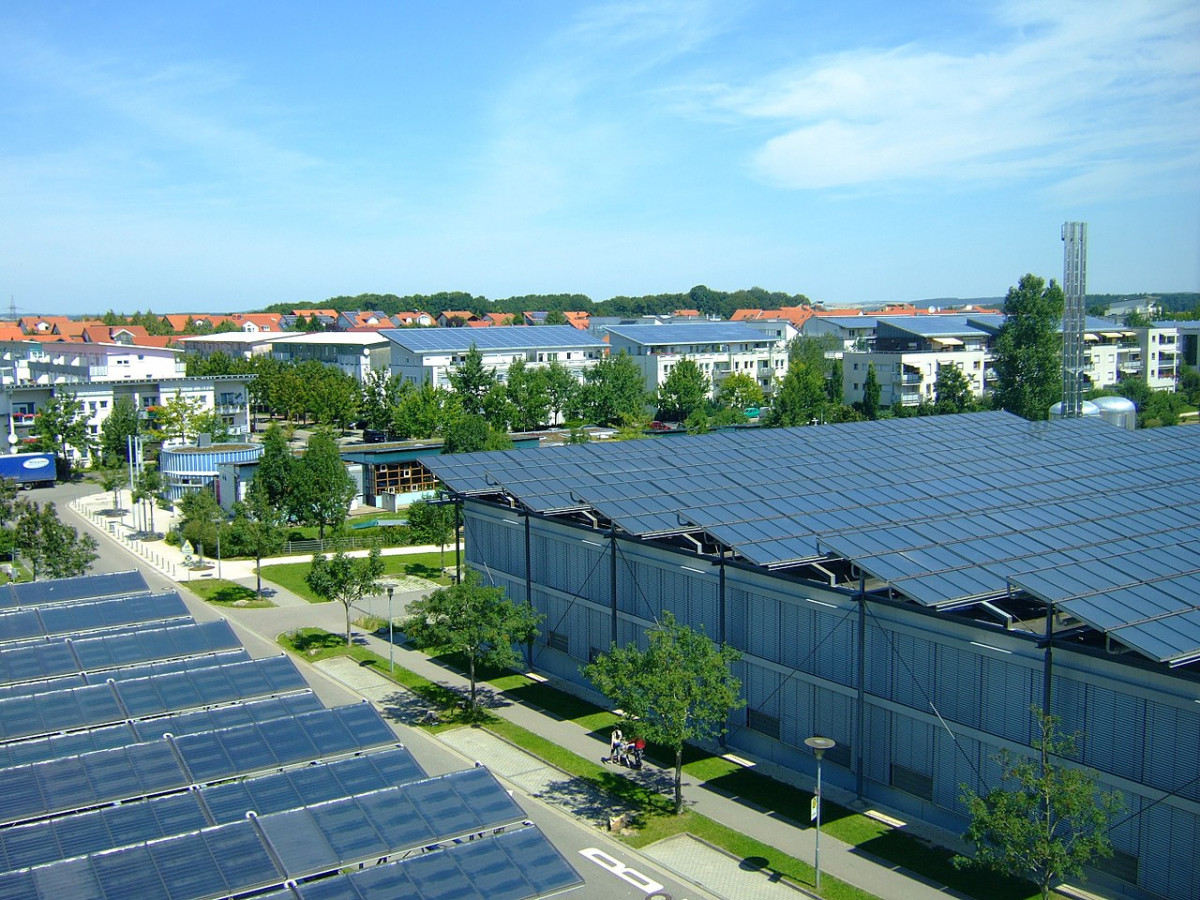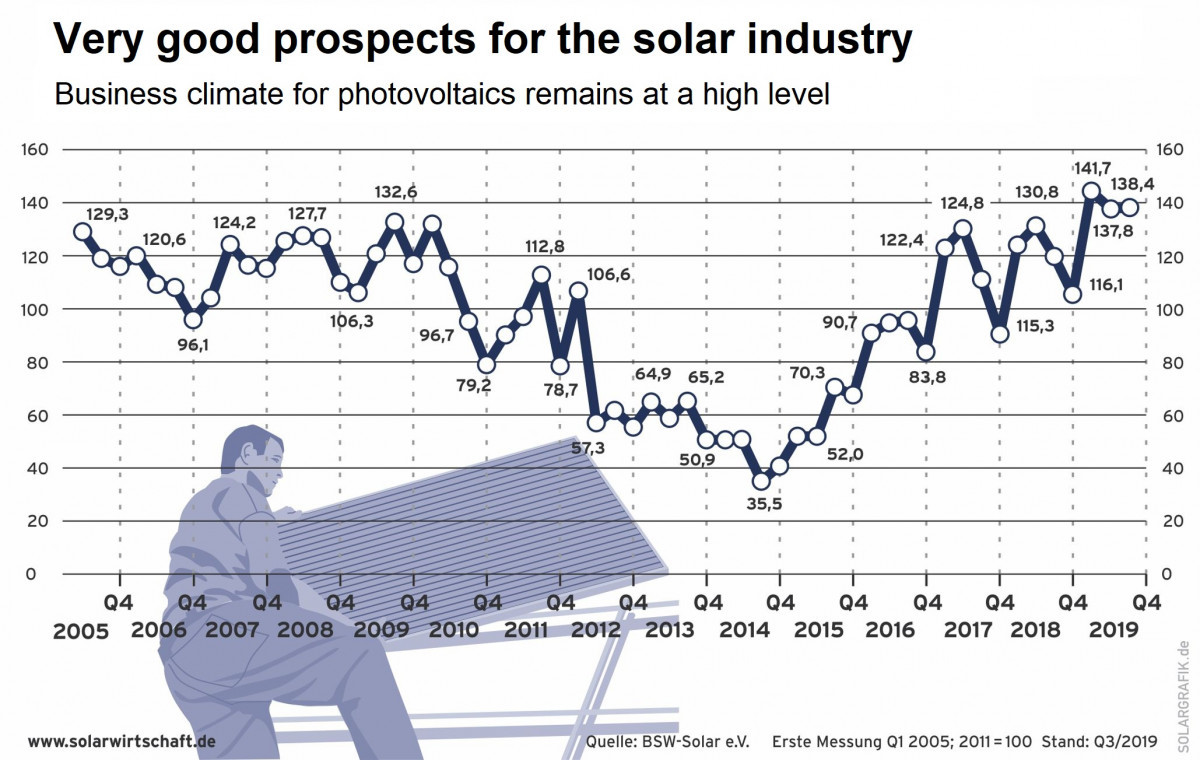Risen from the ruins, Germany's solar power sector has zest for action in 2020
The decline of Germany's solar power industry has long been common wisdom among energy market observers. A boom in the early 2000s was followed by a rapid decline around 2010 that saw many of the technology's pioneers go out of business due to much cheaper Chinese competitors that benefited from Germany's renewable support. However, business confidence in the sector has bounced back considerably in recent years and the German solar industry today looks ahead at 2020 with much more optimism than many had thought possible just a few years back. Figures released by solar power industry lobby group BSW Solar published in late 2019 confirmed that solar companies have regained confidence, partly driven by the government's climate package, which promised a removal of the current cap on support at 52 gigawatts (GW) – a capacity level expected to be reached soon.
Making good on its promise to remove the cap is among the first things the government coalition needs to do in 2020, BSW Solar head Carsten Körnig told Clean Energy Wire. "If that doesn't happen we will effectively see solar installation of new panels on rooftops grinding to a halt already by spring next year," he said. Moreover, current expansion planning should be increased threefold and auction volumes also lifted substantially in order to stay on track towards reaching Germany's emissions reduction targets. "We need 10 GW of new installations per year to compensate for the phaseout of nuclear and coal power," Körnig said. The BSW Solar currently expects that only 4 GW will be added in 2020.
Solar PV proved to be a reliable power source in Germany in 2019, especially and perhaps unsurprisingly during the summer months. In June, it was the northern European country's single largest source of electricity, generating 19 percent of the net public electricity supply over a whole month. The total share in gross output in 2019 reached nearly 7.5 percent. Moreover, solar power continues to be the favoured renewable energy source for most Germans. A poll conducted in late 2019 showed that nearly 80 percent of respondents that live close to an installation approve of it, far ahead of second-placed wind power, of which 63 percent of those living next to it approve.
The technology's popularity could rise further as home storage systems become more widespread, making it possible to use energy from the sun well into the night and substantially increase a panel's utilisation throughout a 24-hour cycle. The spread of home batteries in Germany already helped Europe make the largest residential storage market globally, according to consultancy Wood Mackenzie. Residential storage will reach the tipping point in Germany by 2022, boosting mass adoption of the technology in hundreds of thousands of households across the country, the analysis forecasts.
BSW Solar expects that solar power will also become increasingly important for the country's heating supply, aided by the fact that the government will allow tax rebates for heating modernisations that use solar energy and higher grants to stimulate the market in 2020. "Also the foreseeable increase in heating costs due to CO2 pricing is set to encourage demand," Körnig said. However, it is unlikely that this will be sufficient to reach the building sector's climate targets, which can only be achieved through increased expansion and stricter minimum standards for modernisation, he added. "There is a vast and so far unused cheap solar power potential for supplying rural areas and cities," Körnig stressed.
Kerstin Andreae, head of energy industry lobby group BDEW, said the importance and potential of solar power has been slightly overlooked in the past months, in which the stalled expansion of onshore wind power dominated debates in the energy sector. "We need to refocus on solar power," Andreae added.
The BDEW is calling for solar power to be made a priority in 2020 and is advocating for an amendment to Germany's Renewable Energy Act (EEG) that would spur a faster rollout of the technology. Key measures would include a removal of the cap on support and the promotion of tenant electricity concepts that facilitate installations on many residential buildings. The scheme promoted by Germany's economy ministry has not lived up to the government's expectations so far, with only about 700 facilities supplying tenants with electricity from their own rooftops by mid-2019. "We need to bring the energy transition to the inner cities," Andreae said.
"Vast and so far unused cheap solar power potential"
BSW Solar expects that solar power will also become increasingly important for the country's heating supply, aided by the fact that the government will allow tax rebates for heating modernisations that use solar energy and higher grants to stimulate the market in 2020. "Also the foreseeable increase in heating costs due to CO2 pricing is set to encourage demand," Körnig said. However, it is unlikely that this will be sufficient to reach the building sector's climate targets, which can only be achieved through increased expansion and stricter minimum standards for modernisation, he added. "There is a vast and so far unused cheap solar power potential for supplying rural areas and cities," Körnig stressed.
Kerstin Andreae, head of energy industry lobby group BDEW, said the importance and potential of solar power has been slightly overlooked in the past months, in which the stalled expansion of onshore wind power dominated debates in the energy sector. "We need to refocus on solar power," Andreae added.
The BDEW is calling for solar power to be made a priority in 2020 and is advocating for an amendment to Germany's Renewable Energy Act (EEG) that would spur a faster rollout of the technology. Key measures would include a removal of the cap on support and the promotion of tenant electricity concepts that facilitate installations on many residential buildings. The scheme promoted by Germany's economy ministry has not lived up to the government's expectations so far, with only about 700 facilities supplying tenants with electricity from their own rooftops by mid-2019. "We need to bring the energy transition to the inner cities," Andreae said.



